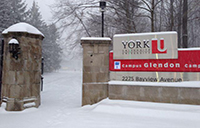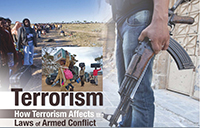York University research leaders were recognized on Feb. 24 for their outstanding achievements during the fourth annual York U Research Leaders celebration.
Hosted by York University President and Vice-Chancellor Mamdouh Shoukri and Vice-President Research and Innovation Robert Haché, and Celia Haig-Brown, associate vice-president research, who officiated as event MC, the University celebrated the outstanding research achievements of several York researchers, students and postdoctoral fellows.


Researchers and students were recognized for achievements that ranged from being appointed a Fellow of the Royal Society of Canada to being the lead for a Partnership Grant award by the Social Sciences & Humanities Research Council of Canada to being appointed a Canada Research Chair to being the lead on a large scale research grant from the Natural Sciences & Engineering Research Council of Canada and more. This year’s Research Leaders event was dedicated in memory of Lassonde School of Engineering Professor Nick Cercone, who was posthumously recognized for his research achievements.
“Every year for the past four years we have gathered at this event to recognize research excellence and success across the University – and each year it becomes clearer that York researchers are taking their place among the world’s leading scholars and experts,” said Shoukri. “The work of our scholars actively enriches the atmosphere of learning at York University, and is at the heart of our efforts to train the next generation of thought leaders.”
Shoukri introduced the keynote speaker, Pat Horgan, Vice-President Manufacturing, Development & Operations at IBM Canada. Horgan spoke about the tremendous impact of York research and the importance of industry-academic collaborations in the broader community, highlighting York’s research partnerships with IBM Canada.

“Today marks our fourth annual York University Research Leaders celebration,” noted Haché in his remarks. “We plan to continue growing the tradition – the celebration of our research and scholarly accomplishments – and the valuable contribution that research, scholarship and creative activity at York is making to society.”
Haig-Brown noted each research leader’s individual accomplishments as they were presented with gifts by Shoukri and Haché. The list of researchers, postdoctoral fellows and students who were honoured is as follows:
Stacey Allison-Cassin, Associate Librarian, Reference Department, Scott Library
Alidad Amirfazli, Interim Chair and Professor, Department of Mechanical Engineering, Lassonde School of Engineering
Kristin Andrews, Associate Professor, Department of Philosophy, Faculty of Liberal Arts & Professional Studies
Uzo Anucha, Associate Professor, School of Social Work, Faculty of Liberal Arts & Professional Studies
Ali Asgary, Associate Professor, School of Administrative Studies, Disaster & Emergency Management, Faculty of Liberal Arts & Professional Studies
Peter Backx, Professor and Canada Research Chair in Cardiovascular Biology, Department of Biology, Faculty of Science
Jacob Beck, Assistant Professor, Department of Philosophy, Faculty of Liberal Arts & Professional Studies
Benjamin L. Berger, Associate Dean (Students) and Associate Professor, Osgoode Hall Law School
Sampa Bhadra, Professor, Department of Physics & Astronomy, Faculty of Science
Margaret Boittin, Assistant Professor, Osgoode Hall Law School
Deborah Britzman, Distinguished Research Professor, Faculty of Education
Annie Bunting, Associate Professor, Department of Social Science, Faculty of Liberal Arts & Professional Studies
Rosemary Coombe, Professor and Canada Research Chair in Law, Communication & Culture, Department of Anthropology & Department of Social Science, Faculty of Liberal Arts & Professional Studies
Michael Daly, Associate Professor, Department of Earth & Space Science & Engineering, Lassonde School of Engineering
Paul Delaney, Senior Lecturer, Department of Physics & Astronomy and Director, Division of Science, Faculty of Science
Mario DiPaolantonio, Associate Professor, Faculty of Education
Christo El Morr, Assistant Professor, School of Health Policy & Management, Faculty of Health
James Elder, Associate Professor, Department of Electrical Engineering & Computer Science, Lassonde School of Engineering and Professor, Department of Psychology, Faculty of Health
Samantha Fashler, Department of Psychology, Faculty of Health
Seth Feldman, Professor, Department of Cinema & Media Arts, School of the Arts, Media, Performance & Design

Stephen Gaetz, Professor, Faculty of Education
Kathleen Gould-Lundy, Department of Professional Learning, Faculty of Education
Jinthana Haritaworn, Assistant Professor, Faculty of Environmental Studies
Jane Heffernan, Associate Professor, Department of Mathematics & Statistics, Faculty of Science
Jimmy Huang, Professor and Director, School of Information Technology, Faculty of Liberal Arts & Professional Studies
Demian Ifa, Assistant Professor, Department of Chemistry, Faculty of Science
Lesley Jacobs, Professor, Department of Social Science and the Department of Political Science, Faculty of Liberal Arts & Professional Studies
Ray Jayawardhana, Dean and Professor, Department of Physics & Astronomy, Faculty of Science
Jennifer Jenson, Professor, Faculty of Education
Hui Jiang, Professor, Department of Electrical Engineering & Computer Science, Lassonde School of Engineering
Jolin Joseph, Teaching Assistant, Department of Gender, Feminist & Women’s Studies, Faculty of Liberal Arts & Professional Studies
Mark Jurdjevic, Associate Professor and Chair, Department of History, Glendon College
Stanislav Kirschbaum, Professor and Chair, Department of International Studies, Glendon College
Fuyuki Kurasawa, Associate Professor, Department of Sociology, Faculty of Liberal Arts & Professional Studies and York Research Chair in Global Digital Citizenship
Christopher Kyriakides, Associate Professor, Department of Sociology, Faculty of Liberal Arts & Professional Studies and Canada Research Chair in Socially Engaged Research in Race and Racialization
Richard Last, Department of Humanities, Faculty of Liberal Arts & Professional Studies
Regina Lee, Chair and Associate Professor, Department of Earth & Space Science & Engineering, Lassonde School of Engineering
Barry Lever, Distinguished Research Professor, Department of Chemistry, Faculty of Science
Mary Elizabeth Luka, Sensorium Centre for Digital Arts & Technology, School of Arts, Media, Performance & Design
Kyo Maclear, Education Program, Faculty of Graduate Studies
Heath MacMillan, Department of Biology, Faculty of Science
Tom McElroy, CSA/ABB/NSERC Industrial Research Chair and Professor of Atmospheric Remote Sounding, Department of Earth & Space Science & Engineering, Lassonde School of Engineering
Susan McGrath, Professor, School of Social Work, Lassonde School of Engineering
Deborah McGregor, Associate Professor, Osgoode Hall Law School and Faculty of Environmental Studies and Canada Research Chair in Indigenous Environmental Science
Scott Menary, Professor, Department of Physics & Astronomy, Faculty of Science
Sushanta Mitra, Associate Vice-President Research and Professor, Department of Mechanical Engineering, Lassonde School of Engineering
Haideh Moghissi, Professor, Department of Equity Studies, Faculty of Liberal Arts & Professional Studies
Lewis Molot, Professor, Faculty of Environmental Studies
Noa Nahmias, History Program, Faculty of Graduate Studies
Norio Ota, Associate Lecturer, Department of Languages, Literatures and Linguistics, Faculty of Liberal Arts & Professional Studies
Debra Pepler, Distinguished Research Professor, Department of Psychology, Faculty of Health
Marie-Christine Pioffet, Professor, Department of French Studies, Faculty of Liberal Arts & Professional Studies
Emanuel Rosonina, Assistant Professor, Department of Biology, Faculty of Science
Adrian Shubert, Professor, Department of History, Faculty of Liberal Arts & Professional Studies
Gunho Sohn, Associate Professor, Department of Earth & Space Science & Engineering, Lassonde School of Engineering
Paul Sych, Associate Professor, Department of Design, School of Arts, Media, Performance & Design
Salvatore Totino, Course Director, Faculty of Education
John Tsotsos, Distinguished Research Professor, Canada Research Chair in Computational Vision, Department of Electrical Engineering & Computer Science, Lassonde School of Engineering
Sean Tulin, Assistant Professor, Department of Physics & Astronomy, Faculty of Science and Canada Research Chair in Particle Physics and Cosmology
Doug Van Nort, Assistant Professor, Department of Theatre and Department of Digital Media, School of the Arts, Media, Performance and Design and Canada Research Chair in Digital Performance
Christopher Vanden Berg, Political Science Program, Faculty of Graduate Studies
Peter Victor, Professor, Faculty of Environmental Studies
Leah F. Vosko, Professor, Department of Political Science, Faculty of Liberal Arts & Professional Studies and Canada Research Chair in the Political Economy of Gender & Work
Graham Wakefield, Assistant Professor, Department of Visual Art & Art History and Department of Digital Media, School of the Arts, Media, Performance & Design and Canada Research Chair in Interactive Information Visualization
Derek Wilson, Associate Professor, Department of Chemistry, Faculty of Science
Thilo Womelsdorf, Associate Professor, Department of Biology, Faculty of Science
Jianhong Wu, Professor Department of Mathematics & Statistics, Faculty of Science and Canada Research Chair in Industrial & Applied Mathematics
Gerald Young, Associate Professor, Department of Psychology, Glendon College
Dessi Zaharieva, School of Kinesiology & Health Science, Faculty of Health
Amro Zayed, Assistant Professor, Department of Biology, Faculty of Science
Book Prizes and Awards
Bonnell, J. (2014). Reclaiming the Don: An Environmental History of Toronto’s Don River Valley. Toronto: University of Toronto Press.
Colla, Shiela, Williams, P., Thorp, R. & Richardson, L. (2014). Bumble Bees of North America: An Identification Guide. New Jersey: Princeton University Press.
Cothran, B. (2014). Remembering the Modoc War: Redemptive Violence and the Making of American Innocence. Chapel Hill: University of North Carolina Press.
Gilbert, J. (2014). Sexuality in school: The limits of education. Minneapolis, MN: University of Minnesota Press.
Hoffmann, R. (2014). An Environmental History of Medieval Europe. Cambridge: Cambridge University Press.
Jenkins, W. (2013). Between Raid and Rebellion: The Irish in Buffalo and Toronto, 1867-1916. Montreal: McGill-Queen’s University Press.
McGriffin, E. (2014). Subduction Zone. St. Johns: Pedlar Press.
Smardon, B. (2014). Asleep at the Switch: The Political Economy of Federal Research and Development Policy since 1960. Montreal: McGill-Queen’s University Press.
The winners of the Undergraduate Research Fair, held earlier in the day in Scott Library, were also recognized at the Research Leaders event. University Librarian Joy Kirchner spoke about their achievements and highlighted the importance of undergraduate research.

Dean and Associate Vice-President Graduate in the Faculty of Graduate Studies Barbara Crow followed Davidson and highlighted graduate student research at York. Her remarks were presented in front of a slideshow of various students’ achievements.
Shoukri presented Distinguished Research Professor Bridget Stutchbury, Faculty of Science, with the 2016 President’s Research Excellence Award and Professor Rebecca Pillai Riddell, Faculty of Health, and York Research Chair in Pain and Mental Health, with the 2016 President’s Emerging Research Leadership Award.
Stutchbury was honoured with the 2016 President’s Research Excellence Award for her significant contributions to outstanding research on the ecology, behaviour and conservation of birds.
Pillai Riddell was recognized with the 2016 President’s Emerging Research Leadership Award for establishing the first norms for the development of acute pain behaviours in healthy infants, within the context of primary caregivers through her (the Opportunities to Understand Childhood Hurt [OUCH]) Lab at York.
For more information on the President’s Research Award recipients, see the Feb. 22 YFile story.


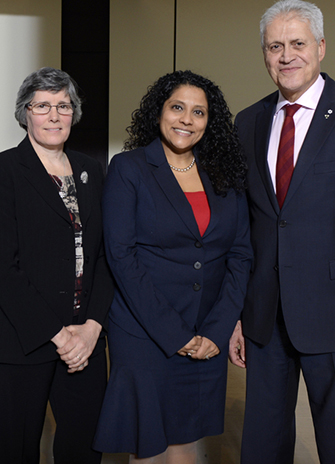
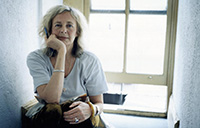

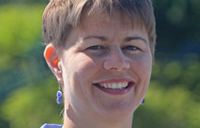

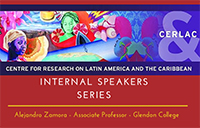

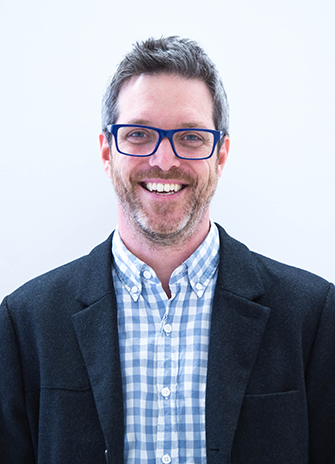


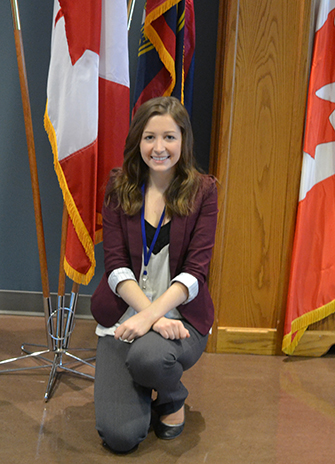

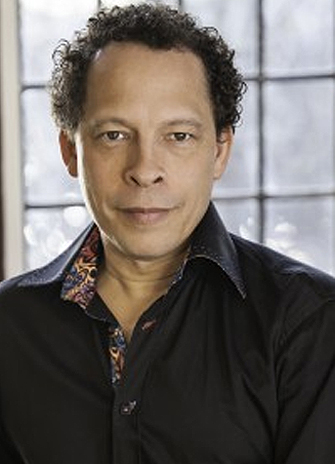
 Celebrated author Lawrence Hill will present the annual Centre for Refugee Studies Lecture tonight from 6:30 to 10pm, in Room A100 in the Centre of Excellence on the Glendon campus. Hill will speak about his new novel The Illegal (2015).
Celebrated author Lawrence Hill will present the annual Centre for Refugee Studies Lecture tonight from 6:30 to 10pm, in Room A100 in the Centre of Excellence on the Glendon campus. Hill will speak about his new novel The Illegal (2015).